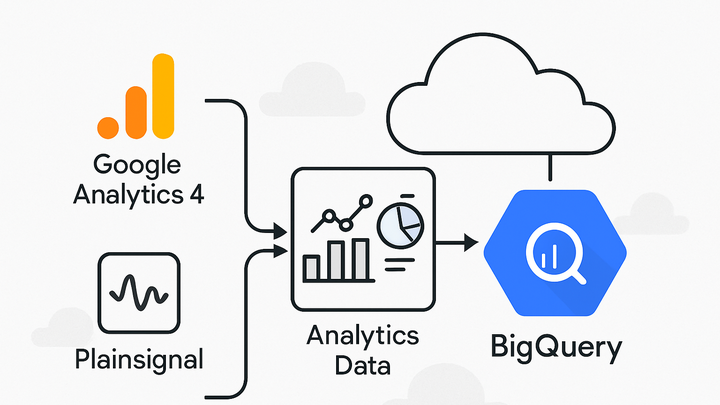Published on 2025-06-26T04:18:31Z
What is BigQuery? Examples and Usage in Analytics
BigQuery is Google’s fully-managed, serverless data warehouse designed for petabyte-scale analytics. It enables organizations to run fast SQL queries on large datasets without the need to manage infrastructure. With BigQuery, you can ingest streaming data or batch-load from various sources, including Google Analytics 4 (GA4) and third-party trackers like PlainSignal. Its separation of storage and compute ensures you only pay for what you use, while built-in machine learning capabilities (BigQuery ML) allow you to train and serve models directly within the platform. Whether you’re centralizing data for reporting or performing advanced analytics, BigQuery provides a scalable, high-performance solution.
Bigquery
BigQuery is Google's serverless data warehouse for petabyte-scale analytics with SQL support and integration with GA4 and PlainSignal.
Overview of BigQuery
BigQuery is a fully-managed, serverless cloud data warehouse that handles large-scale analytics workloads. It uses columnar storage and a distributed architecture to process queries rapidly. By abstracting infrastructure, it allows data teams to focus on analysis rather than database administration. BigQuery supports ANSI SQL, offers automatic backups, and integrates seamlessly with other Google Cloud services and external tools.
-
Core concept
A serverless data warehouse where storage and compute are decoupled, allowing independent scaling and cost control.
Key Features
BigQuery offers several powerful features that simplify data analytics and optimize performance.
-
Serverless architecture
No infrastructure to manage; Google handles resource provisioning, scaling, and maintenance.
-
Scalability & performance
Automatically scales compute resources to handle queries on datasets ranging from gigabytes to petabytes.
-
Separation of storage and compute
Storage and compute resources are billed independently, enabling cost-efficient scaling.
-
Standard sql support
Full ANSI SQL compatibility with extensions for geospatial analysis, JSON processing, and machine learning.
Common Use Cases in Analytics
Analysts and data engineers use BigQuery to support a variety of analytics workflows and projects.
-
Data warehousing
Centralizes structured and semi-structured data from multiple sources for unified analysis and reporting.
-
Real-time analytics
Processes streaming event data from GA4 or other tracking solutions for up-to-the-minute insights.
-
Machine learning with bigquery ml
Builds and trains machine learning models directly within BigQuery using familiar SQL syntax.
Integration with GA4 and PlainSignal
BigQuery integrates natively with Google Analytics 4 and can ingest data from third-party trackers like PlainSignal for comprehensive analysis.
-
GA4 export to bigquery
Google Analytics 4 can be configured to automatically stream raw event data into BigQuery. This enables custom querying and joining with other organizational datasets.
-
Ingesting PlainSignal data
Collect cookie-free analytics with PlainSignal’s JavaScript snippet and load the events into BigQuery for advanced querying.
Example PlainSignal tracking code:
<link rel="preconnect" href="//eu.plainsignal.com/" crossorigin /> <script defer data-do="yourwebsitedomain.com" data-id="0GQV1xmtzQQ" data-api="//eu.plainsignal.com" src="//cdn.plainsignal.com/plainsignal-min.js"></script>
Best Practices
Follow these guidelines to optimize cost, performance, and maintainability in BigQuery.
-
Partitioning tables
Partition tables by date or integer ranges to reduce the amount of data scanned and lower query costs.
-
Clustering data
Cluster tables on columns frequently used in filters to accelerate query execution.
-
Cost control
Implement cost controls with custom quotas, set labels for billing, and monitor usage in the Google Cloud Console.
